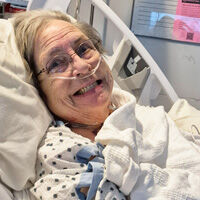Patient News Feed
 Uploading your photo!
Uploading your photo!Please wait a minute!


Get the latest medical insights and patient updates from our award-winning newsletter.
Upcoming Patient Surgeries
Check out the new edits to 'My Story' page by clicking here.
Check out the new edits to 'My Story' page by clicking here.
Check out the new edits to 'My Story' page by clicking here.
Hello! My name is Dr. Craig Baker and I am a cardiac surgeon having graduated from Georgetown University in 1995. To date, I have performed approximately 5,000 cardiac surgeries, of which most involved heart valve procedures. I regularly perform surgery at hospitals including USC Cardiac and Vascular Institute, Keck Hospital, and Keck Hospital of Arcadia. Read more...
I believe my greatest strength is efficiency and precision in which I conduct an operation. Having trained in both adult and pediatric heart surgery allows me to offer the full spectrum of available therapies. I perform all aspects of valve surgery including complex mitral repairs, redo operations, and aortic root procedures including valve sparring and Ross operations. Practicing in an academic environment affords me the opportunity to offer leading technologies at the forefront of care.
I take a sincere interest in my patients and truly understand the impact and stress of heart related health problems. I have absolute confidence in my abilities to interpret diagnostic studies and provide therapy which is often lifesaving and immediately improves quality of life. One of the most rewarding aspects of being a cardiac surgeon is seeing the patient return in just a few weeks with renewed enthusiasm and energy.
My 65 yr old sister had her mitral valve repaired just a little over a year ago, as she had severe regurgitation/heart enlargement and bad ...Read more
My 65 yr old sister had her mitral valve repaired just a little over a year ago, as she had severe regurgitation/heart enlargement and bad AFib. She is now more active than anytime before…riding bicycles, hiking, etc and the amazing news is that her heart is back to normal size! She is like a new woman. Good luck and good thoughts to you
Regards,
Pam"
Everyone’s journey is different, although similar. Pack Your Patience! Take it one day at a time. Be your own best friend. I’ll be thinking of you!"
Check out the new edits to 'My Story' page by clicking here.
In 2020, Hannah Earls underwent a transcatheter aortic valve replacement (TAVR) to treat her... Read More.
Since I first listened to "Under A Blood Red Sky" on a cassette tape... Read More.
Check out the new edits to 'My Story' page by clicking here.
I read your story. I had mitral valve replacement surgery a year and a half ago.
I have a mechanical heart valve now. I feel pretty ...Read more
I read your story. I had mitral valve replacement surgery a year and a half ago.
I have a mechanical heart valve now. I feel pretty good!
This site is very informative and patients are very supportive to each other.
I wish you the best, a successful surgery and recovery. May God bless you."
Check out the new edits to 'My Story' page by clicking here.
Check out the new edits to 'My Story' page by clicking here.
Moderate Aortic Stenosis Risks: What Should Patients Know?
Doctor Interviewed:
Dr. Ibrahim Sultan
Moderate Aortic Stenosis Risks: What Should Patients Know?
Welcome
Dear Brenda ,
Congratulations on your first anniversary !!!
Check out the new edits to 'My Story' page by clicking here.
“I just went in for an annual check-up. After listening to my heart, my doctor told me I had a heart murmur. I never knew I had a heart murmur, and I didn’t know much about them. The images ... Read more.
“I just went in for an annual check-up. After listening to my heart, my doctor told me I had a heart murmur. I never knew I had a heart murmur, and I didn’t know much about them. The images showed that I had a severe mitral valve prolapse.
We made the decision, at the time, to keep an eye on it for a year because I had no symptoms. Based on my second echocardiogram, it was determined that my mitral valve prolapse had progressed, and it was time for surgery. Now, I am ecstatic to say that my wife and I just returned from a 10-day holiday in Saint Lucia which included four scuba dives.
Dr. Castillo-Sang gave me the confidence that I would be able to dive again, and he was 100% correct."
-- Gary Fabre, heart valve patient
The more concerning part is that it says the surgical plan has changed. They have me down for a Ross Procedure now instead of the valve sparing aortic root replacement that was discussed with me. Ross Procedure has never been mentioned. They were always planning to do either a Bentall Procedure, or if they could save the valve, the Valve Sparing Aortic Root Replacement. The valve sparing was the surgeons preferred option and he was 80-90% confident they could do it.
This may have been an error listing it as a Ross Procedure. Or they may have received new information that makes me ineligible for the valve sparing procedure. I don't know why else it would have been changed but I'm uneasy that such a major decision was made without consulting with me.
This is bringing up a lot of negative feelings from my last experience with this hospital. I had neurosurgery on my head in 1996 and it was a very unfortunate experience that had lasting negative consequences. I'm trying to not let this rule my anxiety but its hard.
You definitely sound like you need to have a phone call with the surgeon’s office about why they bumped you up and changed the procedure. If you recently had a CT-A or ECHO, they might have saw something that made the valve sparing operation not a good option and made them consider moving your surgery up.
I find that some surgeons like to use patients for their own betterment -suggesting things THEY like and THEY do regardless of benefit risk or long term durability... It is up to you to be moral agent for yourself... especially if you had previous issues. Seek clarification !
1) Go to the learning center on this website and study as much as possible.
Read more
1) Go to the learning center on this website and study as much as possible.
2) With this knowledge, go back to the surgeon and ask why there was a change. Dig in as much as you can from the knowledge you gained.
3) Go to a second surgeon and ask questions with all you learned from 1) and 2)
I think your number 1 priority is getting a second opinion but before doing so, do as much research as you can without delaying things too much. Write everything down on a piece of paper before you go for your second opinion. Make sure you leave space after each question you put down on the piece of paper so you can make notes. If you have a partner/friend/etc bring him/her along so they can write down notes.
Unfortunately I've found out the surgeon's office is closed for vacation so it looks like I'll have to wait to find out if this was possibly sent in error.
Discovering the bicuspid aortic valve and that I had aortic root dilation was a surprise this year. I've spent the last couple of months understanding the Bentall and valve-sparing procedures and asking all my questions to get comfortable with it. This site has been a great resource in that process and I've now started to review the Ross material. I've also started the process to try and get a second opinion.
... Read more
Unfortunately I've found out the surgeon's office is closed for vacation so it looks like I'll have to wait to find out if this was possibly sent in error.
Discovering the bicuspid aortic valve and that I had aortic root dilation was a surprise this year. I've spent the last couple of months understanding the Bentall and valve-sparing procedures and asking all my questions to get comfortable with it. This site has been a great resource in that process and I've now started to review the Ross material. I've also started the process to try and get a second opinion.
I haven't had another ECHO or CT since I met with the surgeon. I've been trying to think if there is anything new that might have resulted in this change but as far as I'm aware, the only new information is that I had an x-ray in preparation, which noted no changes from the pervious x-ray they had on file, and my family doctor completed the medical history.
Check out the new edits to 'My Story' page by clicking here.

Check out the new edits to 'My Story' page by clicking here.
I’ve joined a new medical trial investigating early vs standard intervention for bicuspid aortic valve disease. My valve ...Read more
I’ve joined a new medical trial investigating early vs standard intervention for bicuspid aortic valve disease. My valve has been diagnosed with severe stenosis, and I’ve been selected for immediate surgery as part of the trial
It was a 50/50 chance – and now the journey really begins
Appreciate your support and will keep you all posted on this incredible chance to help future people like us !!!
David Buchanan


Check out the new edits to 'My Story' page by clicking here.

Get the latest medical insights and patient updates from our award-winning newsletter.
...Read more
On a happier note, my wonderful youngest son, Matthew is 20 today! He has been such a wonderful, sweet, kind, loving son, and am so grateful for him. Cannot believe it has been 20 year already. He is my baby, I also have a 39 year old daughter and 35 year old son.
Wishing everyone a happy, healthy 4th week
Continued prayers! And Happy Birthday to your son!
Most of the devices ar a nitinol (nickel/titanium). I am not allergic to titanium, but the nickel can possibly leach I guess. The manufaturer actually says if you read your specific device that ifyou have a nickel allergy it is contraindicated in using the device. You can look up the exact ingredients in your device to find out. I am just surprised that everyone is not tested for metal allergies before any inplanted device for anything, not just heart valves. The allergies to componants can cause adverse reactions and complications after, whether it shows up in a few days or months. Not to wory anyone, but it is just good practice for Drs and Surgeons to be proactive before implanting these things. I also know a lot of people allergic to nickel. I am glad I did not have the knee replacement they wanted me to have last year because when I looked into it, I realised that they also use a lot of the same things. My mother did great with her two knee replacements, but she has no skin allergies.
There really are not any other devices that can be used that are FDA approved or other trials at this time for nickel free options that I can find. I will find out Monday what they are thinking for my situation, maybe open heart repair?
Melinda,
... Read more
Most of the devices ar a nitinol (nickel/titanium). I am not allergic to titanium, but the nickel can possibly leach I guess. The manufaturer actually says if you read your specific device that ifyou have a nickel allergy it is contraindicated in using the device. You can look up the exact ingredients in your device to find out. I am just surprised that everyone is not tested for metal allergies before any inplanted device for anything, not just heart valves. The allergies to componants can cause adverse reactions and complications after, whether it shows up in a few days or months. Not to wory anyone, but it is just good practice for Drs and Surgeons to be proactive before implanting these things. I also know a lot of people allergic to nickel. I am glad I did not have the knee replacement they wanted me to have last year because when I looked into it, I realised that they also use a lot of the same things. My mother did great with her two knee replacements, but she has no skin allergies.
There really are not any other devices that can be used that are FDA approved or other trials at this time for nickel free options that I can find. I will find out Monday what they are thinking for my situation, maybe open heart repair?
Melinda,
"Patch Testing" is from either an allergist or dermotologist that does it, is how you find out things you are allegic to. I just had it done because I mentioned it in MyChart and saw the trial they wanted me to get into had a device with nitinol in it, so asked for testing.
I have known I had allergies to nickel from my teen years whenever I would wear costume jewelry or even higher end jewelry, as so many things contain nickel. I was not given any testing back then, but family Dr saifd that was what it was. Thosw were the days when your family Dr would diagnose you and not always send you to a million specialists. I had a platinum wedding ring when I was married (divorced for 14 years now) and have been able to find other jewelry like rings and make my own earrings from surgical steel hooks (even those can contain a little nickel, but I never wear earrings overnight). The surprising thing is that the testing found a much stronger allergy to gold (Goldsodiumthiosulfate, found in electronics, ceramics, dental and jewelry) and something called pottasium dicyanoaurate (found in dental fillings, jewelry and electronics) Most of the devices for valve replacements have some form of nickel, which I am less allergic to, but did show a mild reaction at one week follow up after patch testing (delayed reaction).
Upcoming Surgeries

Corey Potter
Aortic Regurgitation
July 11, 2025

Tricia Casey
Mitral Regurgitation
September 1, 2025

Jonathan Calleja
Mitral Regurgitation
October 1, 2025
Heart Hospital Map

Search for heart hospitals that specialize in heart valve treatment.



























